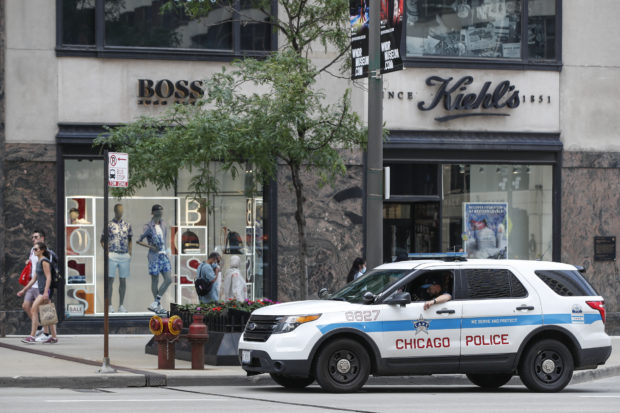
A Chicago Police officer sits in his car as he monitors the area along Michigan Avenue in Chicago, Illinois, on June 18, 2021. AFP
CHICAGO — Businesses in downtown Chicago that survived the pandemic-related economic slump and two spasms of looting last summer should be ecstatic with Monday’s reopening of America’s third-largest city.
Yet, many are batting a new hardship — a surge in crime that is keeping customers, and their money, away.
“I’ve never felt more unsafe than I do now,” said Steve Burrows, a 48-year-old attorney who has called Chicago home his entire life. “I work downtown so I’m here every day during the day but I won’t come down here at night or on the weekend.”
If people like Burrows, suburbanites and the millions of tourists who normally visit the lakefront city stay away, Chicago businesses will feel the impact as many are still trying to emerge from the tumult of the last 16 months.
Roseanna Ander, founder and executive director of the University of Chicago Crime Lab, stresses that the uptick concerns gun crimes and other types of violent crime — also experienced by other cities around the United States.
“The truth is nobody knows exactly what is driving the increase,” Ander said.
But it’s clear the pandemic added to many existing social problems.
“It exacerbated everything, it magnified everything,” she said.
‘Our city is safe’
Chicago is experiencing crime in areas that had generally been considered safe, like the Magnificent Mile commercial district and tony Oak Street, where last August rapper FBG Duck was shot dead in broad daylight.
Violent crime is up in the city in every category. Carjackings, about half committed by juveniles, are happening all over Chicago, while expressway shootings are at levels never seen before with 93 so far this year versus 39 at the same time last year, according to police.
In downtown, much of the lawlessness has been blamed on youths who have come to the area on weekends the last two months, causing havoc by tipping over planters, robbing pedestrians and committing assaults — incidents that business owners say are keeping customers away.
Yet Mayor Lori Lightfoot is optimistic.
On Tuesday, a day Chicago experienced its third mass shooting in three days, she called for more federal help to stem the flow of illegal guns but also struck a positive tone.
“The reality is our city is safe. I stand by that,” said Lightfoot.
City Council member Raymond Lopez, a frequent Lightfoot critic, said she’s living in “fairyland” and blasted her recent changes that banned most police car chases and limited foot chases of suspects.
“The police need to catch criminals. They need to stop planting flowers and building community gardens and start catching people committing crimes. No longer allowing them to run after criminals — they already can’t drive after them. What’s next, no longer being allowed to handcuff them?”
Lopez also said Chicago is getting a bad reputation that is detrimental to its economic recovery, with a quarter of the city’s budget based on revenue from tourism and hospitality.
“When the national mood at the mere mention of our name that Chicago is too dangerous to go to, no one will want to come here.”
The city’s police department has asked the University of Chicago Crime Lab to analyze the violent crime wave.
Crime over the Memorial Day weekend in May, the traditional start of the US summer, was down significantly this year — as the police department ordered officers to work 12-hour shifts, cancelled days off and stepped up patrols downtown.
But offenses surged again after officers returned to normal shifts, prompting the police department to return this weekend to the stepped-up presence.
It’s not clear how long that policy will stay in place, police spokesman Russ Rosenoff said.
‘Scary’
For Jackie Jackson, 49, and Janel Jackson, 27, a mother and daughter who own three Kilwins ice cream shops in Chicago, including one on Michigan Avenue that was looted last summer in violence stemming from protests against police abuses, the crime downtown is causing shops to close early in prime summer season.
“People want to go out and have fun at 7 pm but safety comes first,” Janel Jackson said. “Having to close up so early because no one is downtown affects us tremendously.”
With people wary of going for something like an after-dinner ice cream, it’s hitting the bottom line.
“Everyone is concerned, it’s definitely an issue we should be focused on because it’s all about guests in beds and diners in seats. We want people feeling safe when they come to visit our great city,” said Sam Toia, head of the Illinois Restaurant Association.
Although Jackie Jackson believes in Chicago’s business potential, crime has her making a five-year plan to get out.
“I don’t carry a purse anymore… I don’t go into any parking lots. I can’t go through a drive-thru because I’m so afraid. I don’t wear jewelry. I can’t live.
“I can’t wait to get me a little lake house and sit on the front porch and sip iced tea someplace and live happily ever after because this is scary.”